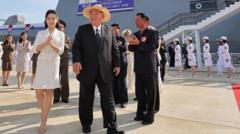In a significant move aimed at fostering improved relations between North and South Korea, the South Korean military has announced the suspension of its loudspeaker propaganda broadcasts across the border. This development comes in the wake of the election of President Lee Jae-myung, who campaigned on the promise of enhancing inter-Korean ties. North Korea has long perceived these broadcasts as acts of hostility, previously threating retaliation against them.
South Korea Halts Propaganda Loudspeakers in Bid for Inter-Korean Trust

South Korea Halts Propaganda Loudspeakers in Bid for Inter-Korean Trust
Seoul's military suspends loudspeakers broadcasting propaganda to North Korea to foster better relations following a leadership change.
The loudspeaker transmissions were most recently resumed in June 2022, following North Korea's provocative actions which included sending balloons filled with refuse across the border. These broadcasts typically included news from both Koreas, along with information highlighting democratic life in the South. The relationship between the two Koreas soured under the previous administration of Yoon Suk Yeol, who took a firmer stance towards Pyongyang. This led to his impeachment following a controversial move to impose martial law over alleged threats from anti-state factions and North Korean sympathizers.
New President Lee is pursuing a different strategy by prioritizing dialogue with North Korea to ease tensions. The military described the suspension of the broadcasts as a step towards "restoring trust in inter-Korean relations and achieving peace on the Korean Peninsula."
However, advocates for North Korean human rights have condemned this suspension, asserting that the broadcasts served as a crucial link for North Korean citizens, reminding them of the outside world. Hana Song, director at the Database Center for North Korean Human Rights, expressed concerns that this gesture could signify a return to appeasing the North Korean regime.
On the other hand, residents living near the border have expressed relief, stating that the cessation of loudspeaker noise will allow them to enjoy quieter lives. Ganghwa County officials noted their hope that this decision would alleviate the psychological impact of the North's noise warfare.
Reports from South Korean news outlets suggest that this suspension does not represent a total termination of broadcasts, indicating that the South reserves the option to resume them if necessary. The ability of these broadcasts to reach up to 24 kilometers at night underscores the strategic significance of this communication method. Despite the present suspension, both nations technically remain at war, given that the Korean War ended in 1953 without a peace treaty.
New President Lee is pursuing a different strategy by prioritizing dialogue with North Korea to ease tensions. The military described the suspension of the broadcasts as a step towards "restoring trust in inter-Korean relations and achieving peace on the Korean Peninsula."
However, advocates for North Korean human rights have condemned this suspension, asserting that the broadcasts served as a crucial link for North Korean citizens, reminding them of the outside world. Hana Song, director at the Database Center for North Korean Human Rights, expressed concerns that this gesture could signify a return to appeasing the North Korean regime.
On the other hand, residents living near the border have expressed relief, stating that the cessation of loudspeaker noise will allow them to enjoy quieter lives. Ganghwa County officials noted their hope that this decision would alleviate the psychological impact of the North's noise warfare.
Reports from South Korean news outlets suggest that this suspension does not represent a total termination of broadcasts, indicating that the South reserves the option to resume them if necessary. The ability of these broadcasts to reach up to 24 kilometers at night underscores the strategic significance of this communication method. Despite the present suspension, both nations technically remain at war, given that the Korean War ended in 1953 without a peace treaty.



















